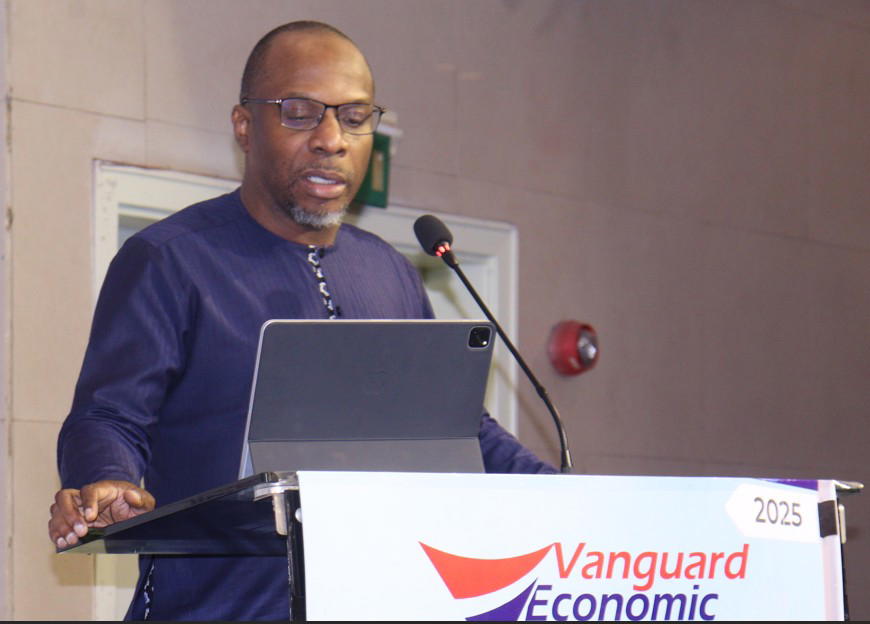
The Group Chief Economist and Managing Director at the African Export-Import Bank (Afreximbank), Dr Yemi Kale has called for a strategic shift in Nigeria’s economic management, warning that the country must move away from its reactive policy approach or risk deepening hardship and macroeconomic instability.
Delivering the keynote address at the Vanguard Economic Discourse held at the Civic Centre in Victoria Island, Lagos, Kale who spoke on the topic ‘Nigeria’s Economic Outlook 2025 – Hardship and Pathways to Sustainable Recovery’ said Nigeria’s economic challenges are often self-inflicted, stemming not from unforeseen external shocks but from poorly designed and inadequately safeguarded domestic policies.
“We often respond, not with foresight, but with reaction,” Kale said. “Interventions are frequently triggered only after economic distress erupts into some form of social risk—at which point emergency measures are deployed hastily and unevenly, rather than pre-emptively shielding citizens from foreseeable disruptions.”
He advocated for anticipatory governance, where policies are designed not only to respond to crises but to foresee and mitigate them before they escalate. He argued that strengthening social safety nets, building public trust in state institutions, and cushioning vulnerable populations should be core elements of this strategy.
“What is particularly concerning in the Nigerian context is that, in many cases, the disruption is not an unanticipated external shock beyond the government’s control,” he noted. “Often, the hardship stems from policies introduced by the state itself. These are not unforeseen events—they are planned decisions.”
Kale observed that despite awareness of potential socio-economic consequences, safeguards are often absent, unimplemented, or deprioritised. He said that in high-inflation environments such as Nigeria’s, citizens tend to delay financial decisions and prioritise job and income security, especially in the public sector. This behaviour, he said, reflects a growing distrust in the economic environment.
He warned that this leads to a cycle of economic stagnation: consumer demand contracts, GDP growth slows, private investment declines, unemployment rises, and poverty becomes more deeply entrenched.
“Businesses, too, adapt defensively in environments characterised by high uncertainty and macroeconomic turbulence,” he said.
“Firms adopt risk-averse hiring plans and defer investments. Budgets are slashed and aspirations give way to mere survival. The focus shifts from building to coping, from innovation to cost containment.”
Kale added that government revenue forecasting has become increasingly unreliable due to volatile commodity prices, fluctuating exchange rates, and inconsistent tax performance. In response, policy often shifts towards short-term and populist interventions—expanding public sector employment, increasing cash transfers, or, in more constrained scenarios, resorting to monetary financing.
“While such measures may provide temporary relief or political capital, they sustain fiscal deficits, undermine macroeconomic stability, and erode the credibility of public institutions,” he said.
He explained that investor confidence deteriorates under such conditions, leading to capital flight, declining asset and currency values, and weakened purchasing power. Investor behaviour, he said, both reflects and reinforces Nigeria’s economic fragility.
“Finally, financial conditions worsen—credit becomes more expensive and less available, weakening financial intermediation and further suppressing economic activity,” Kale noted.
He concluded that Nigeria’s situation reflects not only a domestic failure but also broader global economic forces. In countries with fragile foundations and weak buffers, he said, the compounded impact can be devastating.
“As policymakers and business leaders, we must reframe our understanding of economic disruption—not merely as a technical or fiscal challenge, but as a social emergency,” he said.
Dr Kale noted that his full lecture would explore six or seven strategic themes, beginning with an analysis of global and African economic conditions shaping Nigeria’s 2025 outlook.
The Vanguard Economic Discourse brought together leading voices in policy, finance, and business to examine practical pathways for Nigeria’s economic recovery and resilience.
The post Vanguard Economic Discourse: Afreximbank boss urges shift to anticipatory governance to address Nigeria’s economic woes appeared first on Vanguard News.








